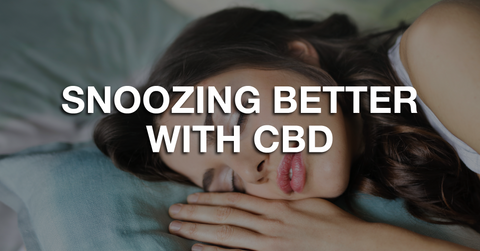Snoozing Better with CBD

March 8 2021, Updated 7:07 p.m. ET
The number of sleep disorders exceeds 80, and the problem of failing to fall asleep is most common- it is estimated that more than 30 million people in America suffer from long-term sleep disorders on a yearly basis.
The process of getting some shut-eye plays an increasingly important role in storing memories, strengthen the immune system, regulate the blood pressure and a long list of other physiological processes. Who would have guessed that the inactive state of sleep, is bustling with critical processes behind closed eyes?
Think of sleep to be playing the role of a housekeeper that makes sure that once the day’s work is done, the furniture and toys are placed where they belong, and the garbage (toxins) is taken out. Now you can imagine how shabby and unkempt the house can look when the housekeeper is unable to make it!
Poor sleep is one of the main contributors to a myriad of medical issues. A rule of thumb is that the average male adult required close to 7-8 hours of solid shut-eye each day. And surprisingly, a large percentage of them don’t get the bare minimum. Here are some of the common sleep-related illnesses:
- Circadian Rhythm imbalance– This is a term that is strongly tied with sleep, as it is your body’s natural sleep cycle. Activities such as staying late and not getting enough sleep can severely disorient the natural pattern.
- Insomnia– It is the inability to fall asleep or stay asleep
- Excessive daytime sleepiness– This is when the individual experiences drowsiness during waking hours especially from medical conditions like narcolepsy.
- Parasomnias- best described by movement when sleeping- Sleep walking.
Poor sleep over a long period of time can have serious repercussions. Those who follow such a lifestyle have been statistically known to have much higher occurrences of stroke, obesity, depression, heart ailments and diabetes, to name a few.
The Endocannabinoid System: How It Links In With Sleep
The endocannabinoid system (ECS) plays an important role in the sleep-wake cycles and other such circadian processes- the ECS is known to act as a regulator of various processes, or sorts.
When it comes to matters of sleep, the ECS is responsible for how you sleep, how long you stay asleep, what parts of your body will be working then, and the regulation of the circadian rhythm. The circadian rhythm is much like the internal body clock that keeps track hours of sleep needed and guides the body to naturally fall asleep. This is a mechanism that is fragile, to say the least, so food, environment, stress, travel and medication can all wreak havoc with the natural circadian rhythm.
The sleep-wake cycle is reined in by means of neurochemicals and cannabinoid receptors, which are concentrated in the central nervous system. One such receptor, called CB1 modulates the neurotransmitter and pulls the lever on excessive neuronal activity- this means that swelling, stress and physical discomfort are reduced. Funny enough, the CB1 receptor is an integral part of the Endocannabinoid system, similar to the CB2. The CB2 receptor is linked to the peripheral nervous system and the immune cells.
Related: Learn more about what CBD products are right for you here.
Dosing CBD For Sound Slumber

Using CBD for better sleep is one of the attributes that make it popular- a natural, healthy herbal extract that helps in inducing sound sleep. In addition to showing phenomenal promise as a safe alternative to conventional sedatives and psychiatric treatment for sleep disorders, CBD can also help in controlling RBD, which is abbreviated as REM behavior disorder. A disorder that causes the individual to have violent dreams that are often vivid and intense.
The usage of CBD helps in decreasing the interruptions in night-time sleep and also lengthen the sleep duration. In essence the quality of sleep in dialed up by a notch with the help of CBD therapy.
Plus, sleep can often also be disrupted due to pain, which can be toned down with the use of CBD. Chronic pain is responsible for close to 1 in 5 of the American population to suffer from weakened sleep. CBD can help in achieving a positive result by means of anti-inflammation and better pain management.
Dosing of CBD for sleep factors depends on your chemical make-up, your age, your fitness level and many more. For starters, it is best to begin a trial-and-error method to find your optimum dosage. Starting off with 20mg of CBD, and waiting for a few hours to completely explore the effects is a must. If you have found the effects to be weak, or not satisfactory enough, then increasing it by 2mg and repeating the process all over again will help you find your sweet spot.
Try to go for full-spectrum CBD, as the terpenes present in them are quite effective in calming and relaxing the body- a key step prior to getting a quality night of rest. Taking the dose in the evening a few hours before sleep would be ideal for you.


